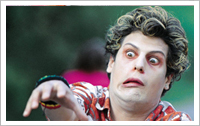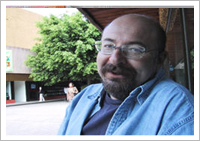By Marilyn Ferdinand
There are a lot of reasons to attend film festivals, but one of the best has to be the chance to meet and ask questions of the filmmakers. There is a real magic in learning about the creative process, the challenges of making and distributing a movie, and the “backstage” drama and comedy that occurred during filming. In my case, a chance to rub elbows with a director turned into my one significant contribution to cinema.

If you followed by Chicago International Film Festival coverage, you know that there were festival guests at two screenings I attended: Dixie Chicks: Shut Up and Sing directors Barbara Kopple and Cecelia Peck, and Steel City director Brian Jun. What you don’t know is that CIFF founder Michael Kutza made a rare appearance to introduce Kopple and Peck, and that the two women first collaborated on a film about Cecilia’s father called A Conversation with Gregory Peck (1999). You don’t know that Steel City was Jun’s fifth attempt at a screenplay, and that it is not autobiographical. You didn’t hear young Ian Ivkovich, who played the main character as a boy, tell a curious audience member that it wasn’t that big a deal to see himself on screen this evening because he already saw the movie at its premiere at Sundance, or hear the laughter that followed this honest answer. Those are opportunities you get at a festival that you can’t get at your local multiplex.
 CIFF has produced other memorable experiences for me in the past. Last year, my husband and I saw a painfully honest film called Learning to Swallow (2005) about a local Chicago artist, Patsy Desmond, with undiagnosed bipolar disorder who tried to end her life by swallowing drain cleaner. Instead, she burned out her esophagus and stomach and now “eats” through a feeding tube attached to her intestine. Desmond and the director Danielle Beverly told us about the rigors of working so closely together during some of the most painful parts of Desmond’s rehabilitation. “I’d throw her out, or she’d throw me out,” said Desmond. So that’s how documentaries like this work. I was very moved to watch Desmond and my husband, both of whom became addicted to pain killers following severe injury and surgery, hug and share a moment of solidarity over beating the drug and surviving their respective ordeals.
CIFF has produced other memorable experiences for me in the past. Last year, my husband and I saw a painfully honest film called Learning to Swallow (2005) about a local Chicago artist, Patsy Desmond, with undiagnosed bipolar disorder who tried to end her life by swallowing drain cleaner. Instead, she burned out her esophagus and stomach and now “eats” through a feeding tube attached to her intestine. Desmond and the director Danielle Beverly told us about the rigors of working so closely together during some of the most painful parts of Desmond’s rehabilitation. “I’d throw her out, or she’d throw me out,” said Desmond. So that’s how documentaries like this work. I was very moved to watch Desmond and my husband, both of whom became addicted to pain killers following severe injury and surgery, hug and share a moment of solidarity over beating the drug and surviving their respective ordeals.
A more humorous meet-the-creators moment came at a late night viewing of Night of the Living Dorks (2004), a German film in my much beloved subgenre, the zombie flick. Imagine my surprise at how thrilled director Matthias Dinter was to be in the city where his Holy Grail of film, Ferris Bueller’s Day Off, takes place. As you can imagine, the Q&A session was long and very laid-back, with Dinter saying how lucky he was to be in the right place at the right time – a scriptwriter needed to feed the beast of demand of a newly united Germany.  I asked him about distribution. This is always the question in a festival-goer’s mind: “Is this great film I just saw going to have a life after film festivals?” He said that there had been no serious interest in distributing the film in the United States, so it was going direct to DVD. This I do not understand. Shaun of the Dead (2004), another great zombie comedy, did alright in the States. Are distributors afraid that fans of these films can’t read subtitles? Is there room for only one foreign zombie comedy each year on American screens? Ah me.
I asked him about distribution. This is always the question in a festival-goer’s mind: “Is this great film I just saw going to have a life after film festivals?” He said that there had been no serious interest in distributing the film in the United States, so it was going direct to DVD. This I do not understand. Shaun of the Dead (2004), another great zombie comedy, did alright in the States. Are distributors afraid that fans of these films can’t read subtitles? Is there room for only one foreign zombie comedy each year on American screens? Ah me.
Roger Ebert’s Overlooked Film Festival near the campus of his alma mater, the University of Illinois at Urbana/Champaign, has had many great festival guests over the years, including the well-known directors John Sayles and Mario and Melvin Van Peebles. I have so many favorite guests from these festivals, including one of my favorite French directors, Bertrand Tavernier, director/movie darling Miranda July, Dutch/Australian director Paul Cox, and star of The Terrorist (1999), Ayesha Dharker, who was completed surrounded by lust-struck college students in the lobby of the theatre. I have two absolute favorites. The first is Chinese director Tian-Ming Wu, whose Q&A was conducted among children who had just seen his wonderfully moving film King of Masks, the free family film Roger has at each festival. The children stood patiently in line on stage, stepped up to the mike to ask their question, and heard Wu’s answer interpreted. It was a wonderful way to share a film with a young audience. The other favorite was Shane Carruth, the one-man band for his film debut Primer (2004). Carruth was nearly stupefied by the praise Roger heaped on him. It was wonderful and a little scary to think what it must have been like to be him – making a feature for $7,000, using the great All the President’s Men as your model, and being told by Roger Ebert that you’re a budding Martin Scorsese.
 The greatest festival guest for me, however, is Francisco Athié, a Mexican director whose psychedelic meditation on death, Vera (2003), screened at the Taos Talking Picture Festival in New Mexico. Knowing that his film might have limited appeal, Francisco said to think of Vera as an LSD trip. “If you go with it, you will have a good time,” he advised. “If you do not go with it, you will have a bad time.” I had a good time, and I had drinks with Francisco at a dive cantina in town along with some other festival attendees after the show. He is such a personable, larger-than-life character that I felt an instant kinship with him. I brought a tape of Vera to Facets; they eventually screened it, and, earlier this year, issued it on the Facets DVD label. If I never do another thing for cinema (and I hope that won’t be true), I can at least say that I helped keep one film from being lost in time.
The greatest festival guest for me, however, is Francisco Athié, a Mexican director whose psychedelic meditation on death, Vera (2003), screened at the Taos Talking Picture Festival in New Mexico. Knowing that his film might have limited appeal, Francisco said to think of Vera as an LSD trip. “If you go with it, you will have a good time,” he advised. “If you do not go with it, you will have a bad time.” I had a good time, and I had drinks with Francisco at a dive cantina in town along with some other festival attendees after the show. He is such a personable, larger-than-life character that I felt an instant kinship with him. I brought a tape of Vera to Facets; they eventually screened it, and, earlier this year, issued it on the Facets DVD label. If I never do another thing for cinema (and I hope that won’t be true), I can at least say that I helped keep one film from being lost in time.
Films are more than the fire and smoke and the bellowing voice of authority. There is always a man (or woman) behind the curtain. Meeting the creator can be an enlightening, joyful, moving experience. Have it.
There are many opportunities to meet the creators in Chicago. In addition to CIFF and other festivals that run throughout the year, the Gene Siskel Film Center and Facets often invite guests to special screenings.
Marilyn Ferdinand is The Beachwood Reporter‘s resident film critic, and the proprietor of Ferdy on Films. Her exclusive coverage of the Chicago International Film Festival includes:
* “Better Than Fiction,” her opening guide to the festival.
* “Corruption and Comedy,” a review of The Comedy of Power, a French New Wave film whose themes will be instantly recognizable to anyone with even the sketchiest knowledge of Chicago politics.
* “Soul in Flames,” a review of Requiem, a remarkable film about modern-day possession and exorcism.
* “A Talent for Torment,” three reviews in one (Spirit of the Soul, Ode to Joy, Steel City) from a disappointing day at the festival.
* “Deep in the Heart of Dixie,” a review of Dixie Chicks: Shut Up and Sing, the inside story of the Dixie Chicks’ political and personal journey as Southern girls ashamed of their Texan president.
* “Boot Straps and Black Boys,” a review of Shoot the Messenger, a British film that challenges standard racial notions in part by featuring a character who might best be described as a black Joe Lieberman Republican.
* “The Elusive Quality of Truthiness,” reviews of three films, including the Austrian film Slumming, La Terra from Italy and the Romanian comedy, 12:08 East of Bucharest.
* “And the Hugo Goes To . . . ” This year’s Hugo Award winners are announced.
* “The Chicago Way,” a rare view of the beautifully restored 1927 original.
* “Love and the Dirty Old Man,” a review of Venus, the festival’s closing film, a Miramax vehicle with Peter O’Toole and Vanessa Redgrave that is superbly written and well-cast.
Posted on October 22, 2006


